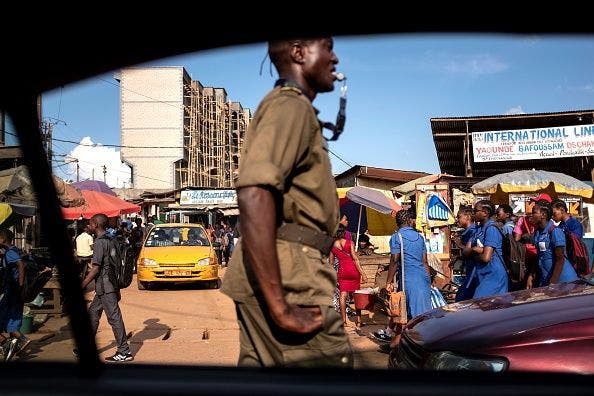NZZ editor Peter B. Birrer traveled to West Africa in the run-up to the World Cup. A collection of impressions.
A traffic policeman in Cameroon’s capital Yaoundé. The country has been ruled by the same president since 1982.
It should be easy to leave the small West African state of Togo. Off to the airport not far away, security check, check in, wait, show your passport, wait, departure. But not on this day at the end of October in Lomé, the capital of Togo.
The taxi driver is punctual, courteous and in better shape than his rickety car. Police control on the way to the airport. The policewoman comes to the passenger side. She stands in front of the sun, looks down and asks, “How are you?” She walks leisurely around the car, the taxi driver gets nervous, and the Togolese escort on the back seat says: “Restez calme.”
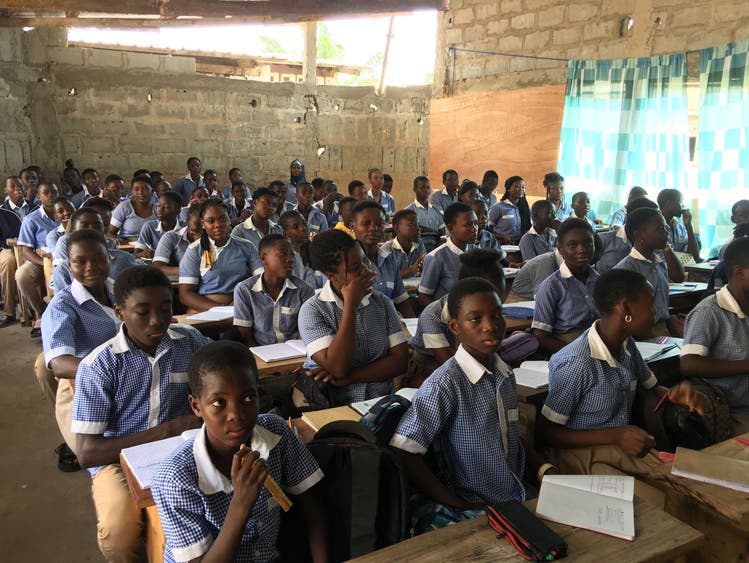
Visit to a Togolese private school.
The policewoman asks for the papers and asks the driver to get out. Both go backwards. “What now?” is the question to the attendant. “C’est le deal,” he replies.
After that, the calculation is simple: the buses cost the equivalent of 3 euros. Nobody knows what for. The Togolese says that the bill went up a bit because there was a white man in the car. But the money does not flow to the Togolese state, no, everyone agrees on that. Of course, the European takes over the buses. The policewoman is counting on that, says the attendant. 3 euros is a lot for the police officer, significantly more than her average daily income. For the European, 3 euros is little, like a tip.
The traveler is held up at passport control
In front of the airport we say goodbye to our Togolese friends. You will be handed the remaining West African Francs. A mistake, as will soon turn out.
The visitor who wants to leave the country gets stuck at passport control. Filling out the online form takes a long time. Even the dates of the corona vaccinations are required, the name of the vaccine and so on. Incomprehension, since one does not enter the country but leaves the country. The passport stamp is denied, the border official waves it away.
Your own name will be called out over loudspeakers.
Back to the form. Fill in, continue, confirm, mother’s name, flight number, flight destination – and now? Again nothing. “The date,” says the official. “Which date?” perplexity. The officer points to a woman who can help me. The woman takes my mobile phone and types in something, wipes, types – and says: “Voilà.” But again nothing, the officer waves it away. The woman picks up her own communications device and casually says, “Do you have any money?” – «No», I reply, «I gave everything to my friends in front of the airport.»
Your own name is called out a second time.
“C’est vous?” asks the woman. “Oui, c’est moi,” I reply, almost begging, “I really don’t have any money, I have to go now.” The woman looks at the official, holds out her device to him, whereupon he stamps the passport. Hurry to the gate, he is not denied access to the plane, although the late passenger has already been deleted from the passenger list.
The waiting plane, the current time, your own name from the loudspeakers – welcome leverage. But he who has no money with him has no money (as a lubricant). It would hardly have been expensive here either. For the European. Togo lets you leave after all.
The young motorcyclists are repeatedly checked
Two days earlier, a chance encounter in Lomé with two young German motorcyclists. One works for an NGO in Benin, the other is visiting. Your route: Benin, Togo, Ghana, Togo and back to Benin. They are unnerved and “just want to go back to Benin”. Why? About five roadside checks every day, paying again and again, “it’s getting unbearable”. As in the film, a policeman comes along who wants to see the papers. “You see,” says the German. At least they don’t have to pay anything this time. Remember the words of the Togolese in the back of the taxi: “Restez calme.”
A German football coach who used to work in Cameroon and didn’t fall flat on his head says: “It’s about prejudice, about the cliché that many are corrupt. And in the end, the prejudice has something to do with reality. There was something unbelievable about it for me. If you get too caught up in European thinking, you don’t stand a chance.”
Yes, the perspective of the European is naturally centered on Europe.
The television director locates “pure interest politics”
Visit to the well-travelled former sports journalist Philippe Bonney, who is now the director of a large media company in the Cameroonian capital of Yaoundé. The conversation revolves around Cameroonian international Nicolas Moumi Ngamaleu, who played football for YB in Switzerland for years before moving to Dinamo Moscow in Russia in the summer of 2022.
Frowning, criticism and incomprehension in Switzerland for a footballer aiming for Russia. The multiple response in Cameroon: “Why not Moscow?”
Bonney talks himself into the fire. He talks about the international community, about its interest politics, about France, about Europe’s colonial past, about the bombing of Libya, about the intervention of the West and France a few years ago in Côte d’Ivoire, when President Laurent Gbagbo was expelled. “He was chased out of the presidential palace, in a sovereign state – and no one said anything about it. Why? Because the power of the strongest applies.”
Bonney is almost unstoppable. “Vous – les blancs,” he says several times. accusing. He has many European friends, he is “from both sides” and knows Europe “not so badly”. In the end, it’s just a matter of one question: “At what point in time does something bother the whites?” He locates “pure interest politics” and says: “If you Europeans have an interest, you come. If you have no interests, you remain aloof and condemned. That’s how many Africans feel.”
That can be the breeding ground for a pro-Russian stance. Russia defies the West.
Images from Burkina Faso can be seen on television in Cameroon. Grim and hooded militarists announce in front of microphones in October what now applies in the country. Scenes like from a bad movie. Anti-government uprisings in Chad, the country bordering Cameroon to the north. Secession movements of the English speakers in northern Cameroon, again and again. It is not recommended to travel there. Kyiv is 5500 kilometers away from Yaoundé. other worlds.
China is warmly welcomed in Togo
Eurocentrism also means, for example, a critical look at China. It’s different in Togo. The Kégué National Stadium in Lomé was built in 2000 thanks to China. Inscriptions at the stadium speak of “excellent relations between Togo and China”. The airport in Lomé is also new, modern, a step back in time from that in Yaoundé. Togo is making progress, the infrastructure in the country with around 9 million inhabitants seems to be more intact than in Cameroon (27 million). Also thanks to China. Why not? China helps. China is an antipode to the West. Like Russia.
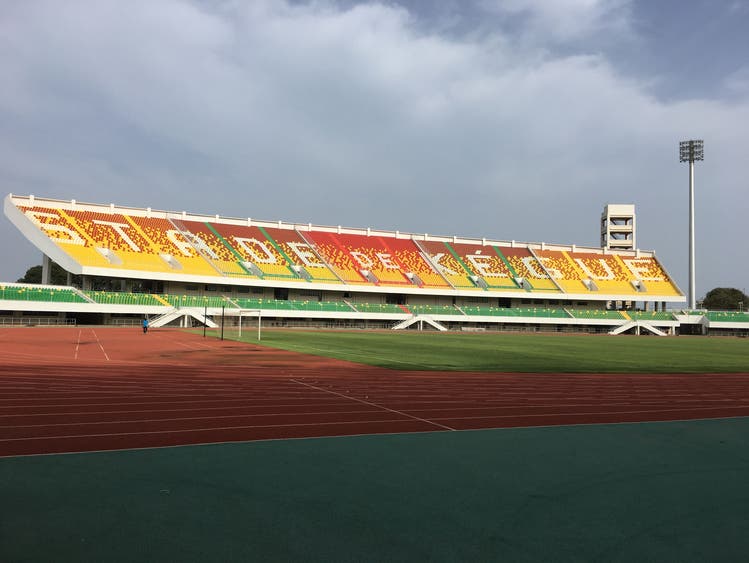
Thanks to China, Togo built and modernized the Kégué National Stadium.
Autocrats have ruled Cameroon and Togo for decades
The European is amazed at the political situation in Cameroon and Togo. Paul Biya has ruled Cameroon since 1982. For 40 years. In February 2023 he will be 90 years old. When football is played in Cameroon, the presenter in the stadium pays homage to the dictator sitting in the stands. He calls him “notre père” and promises that he will be “carried up to heaven”. The relationship between the Cameroonians and their president is difficult to describe. Full of contradictions, it oscillates between awe, indifference and rejection.
In the embassy district of Yaoundé, the journey takes you past the huge US Embassy, which is brightly lit at night. Like everywhere, the USA celebrates (embassy) size and maintains its own palace. Not far away is a walled noble estate owned by Chantal Biya, locals say. This is the country’s premiere lady. The President’s Palace sits enthroned on a hill in Yaoundé, clearly visible to his subjects. Restricted military area.
The presidential palace on the hill and the residence of the Première Dame contrast with the deep holes in the streets and the generally poor infrastructure of Yaoundé.
Faure Gnassingbé has governed Togo since 2005. One of his brothers had a tree-covered villa built in a poor neighborhood in Lomé. Pool included. There is a school a few meters away. The infrastructure would have to be improved. Urgent. But nothing happens, no money. Mansion for the president’s brother here, ramshackle school there. The Togolese teacher looks down from the roof of the neighboring house at the villa of the presidential family and says: “It’s just the way it is with us.” Anger or curses? none.
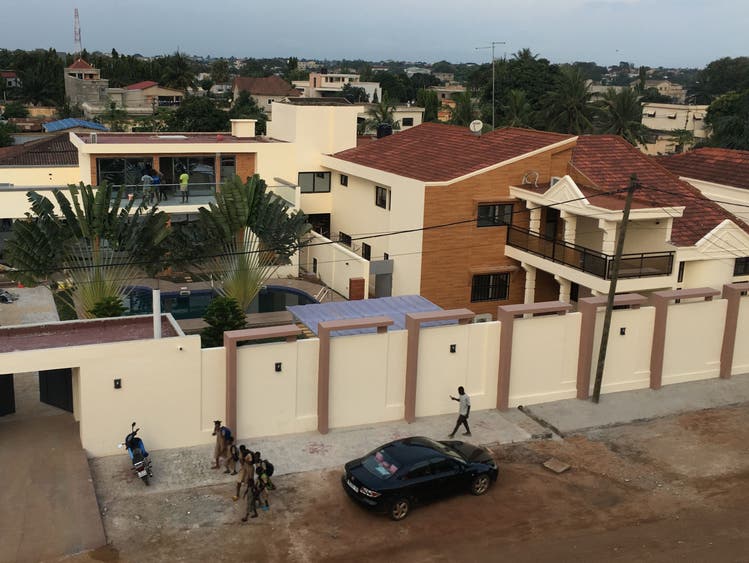
The villa of a brother of the Togolese autocrat – in the middle of a poor district of the capital Lomé.
The father of the Togolese head of state was called Gnassingbé Eyadéma. He ruled Togo for 38 years. When he died in 2005, unrest ensued in the country. struggle for succession. Who has how much power?
When the autocrat visits Switzerland
In Cameroon, European embassy staff express hope that Paul Biya can continue for a few more years. Why? The end of a decade-long reign often results in a period of uncertainty. “But please not during my embassy time,” says a Swiss.
Paul Biya is a good cue. The television director Philippe Bonney says in his cold office: «Yes, Biya has been there for a long time. I understand that the European asks questions about this.” Bonney folds his hands and launches into a monologue: «Why has Switzerland received such a monsieur for 40 years? The border is opened to him, he rents an entire floor in a Geneva hotel for himself, his wife and entourage. Switzerland would have to say: ‘Monsieur Biya, you are not welcome here. Go somewhere else.’ But Switzerland won’t do it.”
There it is again, the politics of interest of the “Occidental power”.
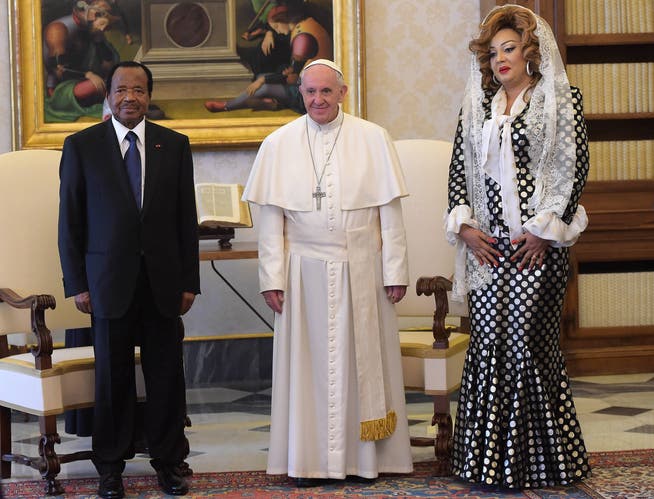
Pope Francis receives Cameroonian head of state Paul Biya and his wife Chantal in 2017.
Africa sometimes engages in counterplay, in whataboutism. Yes, with us it is so and so. “Yes, we are the poor, it will stay that way,” says a Togolese. But what about you, dear Europeans? Play the ball back to the opponent, so I don’t have to talk about myself anymore.
Former Cameroonian football star Roger Milla defends himself against the accusation that the African selections at the World Cup finals often stumbled over the dispute over money: “And in Europe, money is not an issue?” After a visit to a private school in Lomé, there is a discussion about whether children should be physically disciplined – or not. That’s forbidden in Togo, says a local. A teacher replies that physical intervention is not always possible. He explains himself and at some point follows the sentence: “The whites used to beat the blacks, even in the schools.” The short sentence is heard more than once: «Vous, les blancs.» – «You, the white ones.»
